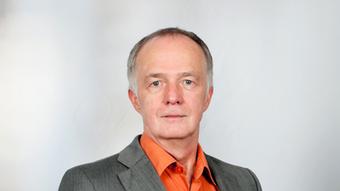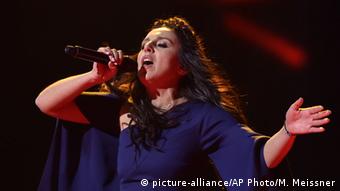http://www.dw.com/en/opinion-is-eurovision-strictly-apolitical-think-again/a-19258722
Ever bigger, with ever more sophisticated technology and growing numbers
of viewers: the Eurovision Song Contest revels in superlatives. But is
it strictly apolitical? Think again! By DW's music editor Rick Fulker.
Ask anyone from eastern Europe, and you'll see how very seriously they take the event.
Interesting in this connection is Russia. A notable statement a couple of years ago by the country's minister of culture remains in memory: "Russia is not Europe." The country, he said, was uniquely Eurasian.
Yet it poured tremendous resources into this year's Eurovision Song Contest (ESC), coupling a Swedish-written song with one of the land's most famous singers and heretofore unprecedented stage technology. They didn't do all that with the intention of losing - or turning its back on Europe.
Instead, Ukraine won with a song that had been highly publicized in the run-up to the event. The Russian delegation of the European Broadcasting Union had even tried to get the song removed from the contest for ostensibly violating the contests prohibition of political content. No, came the answer, the song is generally worded to decry war and persecution in general.
The true winners? First, Jamala, an ethnic Tartar from Crimea - a place occupied two years ago by Russia in what has been called the beginning of a new Cold War. She had explained that her grandmother had told her about a family story of suffering and persecution that she then related in the song.
The second winner of the evening is the European Song Contest itself. The song "1944," in fact, stood out from the rest by being the only one to relate a historical situation. Rather than bubble-gum peace platitudes, its appeal to peace was presented in the historical context of a lament and a protest.
Overall, however, the contest could benefit from more diversity. Standouts from the crowd this year were the rockers of Young Georgian Lolitaz from Georgia, country music twangs from the Netherlands in the person of Douwe Bob, a delightful chanson from Austria sung in French by ZOË and the straight and bittersweet love song by Frans from Sweden.
As for the rest of the entries, there were no freak shows among them, and little deliberately substandard trash. Most were musically calculated to win - and for that very reason, they lost.
At a time when Europe is facing its greatest crisis in decades, the contest was held in European model country Sweden. "Europe is once again facing darker times," said show host Petra Mede.
EBU Media Director Jean Philip De Tender explained to DW that Eurovision is an expressly apolitical event. The showing of the flag of Nagorno Karabakh in Eurovision's green room during one of the semifinals, for instance, had been seen as a political provocation and nearly resulted in the expulsion of a country's delegation. Expressly political statements are taboo at the contest.
But what is political? After her stunning win, Jamala explained at the press conference that she wished for a situation in which her song "1944" didn't need to exist at all. She has presented a story that will be analyzed, and examined, for its content. Clearly that is not a bad thing. Nor is the more general discussion about where art ends and political activism begins.
Will Jamala's song unite or further divide Europe? That will remain to be seen in the coming months - and at the Eurovision Song Contest 2017 - in Ukraine.
Interesting in this connection is Russia. A notable statement a couple of years ago by the country's minister of culture remains in memory: "Russia is not Europe." The country, he said, was uniquely Eurasian.
Yet it poured tremendous resources into this year's Eurovision Song Contest (ESC), coupling a Swedish-written song with one of the land's most famous singers and heretofore unprecedented stage technology. They didn't do all that with the intention of losing - or turning its back on Europe.
Instead, Ukraine won with a song that had been highly publicized in the run-up to the event. The Russian delegation of the European Broadcasting Union had even tried to get the song removed from the contest for ostensibly violating the contests prohibition of political content. No, came the answer, the song is generally worded to decry war and persecution in general.
The true winners? First, Jamala, an ethnic Tartar from Crimea - a place occupied two years ago by Russia in what has been called the beginning of a new Cold War. She had explained that her grandmother had told her about a family story of suffering and persecution that she then related in the song.
The second winner of the evening is the European Song Contest itself. The song "1944," in fact, stood out from the rest by being the only one to relate a historical situation. Rather than bubble-gum peace platitudes, its appeal to peace was presented in the historical context of a lament and a protest.
Overall, however, the contest could benefit from more diversity. Standouts from the crowd this year were the rockers of Young Georgian Lolitaz from Georgia, country music twangs from the Netherlands in the person of Douwe Bob, a delightful chanson from Austria sung in French by ZOË and the straight and bittersweet love song by Frans from Sweden.
As for the rest of the entries, there were no freak shows among them, and little deliberately substandard trash. Most were musically calculated to win - and for that very reason, they lost.
At a time when Europe is facing its greatest crisis in decades, the contest was held in European model country Sweden. "Europe is once again facing darker times," said show host Petra Mede.
EBU Media Director Jean Philip De Tender explained to DW that Eurovision is an expressly apolitical event. The showing of the flag of Nagorno Karabakh in Eurovision's green room during one of the semifinals, for instance, had been seen as a political provocation and nearly resulted in the expulsion of a country's delegation. Expressly political statements are taboo at the contest.
But what is political? After her stunning win, Jamala explained at the press conference that she wished for a situation in which her song "1944" didn't need to exist at all. She has presented a story that will be analyzed, and examined, for its content. Clearly that is not a bad thing. Nor is the more general discussion about where art ends and political activism begins.
Will Jamala's song unite or further divide Europe? That will remain to be seen in the coming months - and at the Eurovision Song Contest 2017 - in Ukraine.



Комментариев нет:
Отправить комментарий